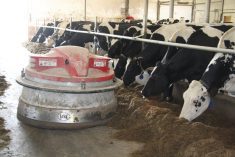BOW ISLAND, Alta. – Deep in southern Alberta, sugar beets are piled high along the roadsides, beans wait for export to Latin America and the last of the fresh Taber corn has been chowed down.
And Canadian Wheat Board candidates hoping to win one of 10 seats on the new board of directors are quickly learning district three straddles two cultures.
District three extends from Lethbridge in southern Alberta to Gravelbourg in southern Saskatchewan, where French is just as likely spoken on the street as English. In this part of Saskatchewan wheat rules, and schoolchildren are taught their province is the breadbasket of the world.
Read Also

Manitoba extends Crown land rent freeze
Manitoba government links the continued rental rate freeze on grazing and forage leases to economic and environmental challenges facing the industry
Southern Alberta is one of the most highly diversified regions in the West. More than half of Canada’s fat cattle are finished here and there is a cornucopia of crops thanks to irrigation and a forgiving climate.
“If it weren’t for other crops, a lot of us wouldn’t be farming anymore,” said one farmer at a candidates forum held last week in Bow Island, in south-central Alberta.
They grow a medley of vegetables from asparagus to zucchini. Many more grow sugar beets, potatoes, corn, spices or sunflowers. In some reaches of the district, peas are more widely grown than the two wheat board controlled grains, wheat and barley.
For these farmers, wheat and barley are just part of a sophisticated crop rotation program.
Nevertheless, feelings about the wheat board and its monopoly run high.
Farmers here have their sugar beets processed at Taber. Lucerne Foods, the supply arm of the Safeway grocery chain, cans and freezes locally grown vegetables at their back door. There are several potato chip and french fry plants in the area and one under construction.
This contrast of cultures forms the basis for one of the most compelling issues in the district.
Some candidates say the district itself and how its borders were drawn is an effort by the federal government to manipulate the outcome of the vote – to drown southern Alberta’s dual market voices in a sea of Saskatchewan wheat board supporters.
“Saskatchewan will nullify the Alberta vote,” said Bob Stenhouse, a candidate from Medicine Hat, Alta. He and Ray Taylor, a candidate from Lethbridge, Alta., said the district was deliberately drawn across provincial lines to ensure a supporter of the wheat board monopoly is elected to the director’s position, even though most farmers in southern Alberta want a dual market. They worry about the outcome since there are more Saskatchewan voters than Alberta.
Candidate Rick Jensen of Webb, Sask., who supports the board’s export monopoly, said support for a dual market is widespread across both provinces and gains strength the closer a farmer lives to the American border.
At the meeting here, most candidates expressed support for some type of dual market, in which the wheat board competes with private companies for farmers’ grain.
Walter Strom started farming in the Bow Island area 75 years ago. His land is rented now, but he has a permit book and intends to vote in this election.
He never approved of the wheat board and having to join its mandatory price pooling system for wheat and barley.
The slate of candidates impresses him, but he doesn’t trust government or its promises to improve the wheat board, even if there are genuine farmers guiding a reformed agency.
“Those who favor dual marketing will be outvoiced. They will be frustrated at every turn,” he said.
His friend Darrell Collins of Burdett, Alta., has farmed here since 1935. He supports a farmer-elected board and wants the agency out of the domestic market.
When questioned how they hope to run a $6 billion corporation, each candidate told the crowd of about 100 that they are willing to learn and pointed out they are there to advise and influence rather than run the daily activities of the board.
“The board needs some common sense. It needs people with dust in their noses to bring a common sense approach,” said candidate Dan Cutforth.
The candidates for this district are Colleen Bianchi, Coutts, Alta.; Dan Cutforth, Barons, Alta.; Rick Jensen, Webb, Sask.; Larry Hill, Swift Current, Sask.; Bill Kaupp, New Dayton, Alta.; Morgan Rockenbach, Wrentham, Alta.; Bob Stenhouse, Medicine Hat, Alta., and Rob Taylor, Lethbridge, Alta.















